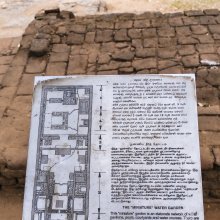Avadi, Āvaḍī, Āvaḍi: 6 definitions
Introduction:
Avadi means something in Hinduism, Sanskrit, the history of ancient India, Marathi, Jainism, Prakrit. If you want to know the exact meaning, history, etymology or English translation of this term then check out the descriptions on this page. Add your comment or reference to a book if you want to contribute to this summary article.
Images (photo gallery)
India history and geography
Source: What is India: Inscriptions of the ŚilāhārasĀvaḍi is the name of a hamlet mentioned in the “Balipattana plates of Raṭṭarāja”. Accordingly, “... an orchard of areca-nuts was also given to him as a means of livelihood of a Brāhmaṇa named Chāṭhavaiya, (son of?) Kuṃvaraiya, grandson of the Brāhmaṇa Sañjhaiya, residing in the hamlet named Āvaḍi, situated to the west of the agrahāra village Palaūre, for (the religious merit of) his grand-daughter Annaṇā...”.
These copper plates (mentioning Āvaḍi) were in the possession of Prof. S. R. Bhandarkar and was issued from Balipattana (the capital of Raṭṭarāja). It records certain gifts made by Raṭṭarāja to Saṅkamaiya, son of the Brāhmaṇa Nāgamaiya. It is dated in the Śaka year 932 on the occasion of the Uttarāyaṇa Saṅkrānti, which fell on Sunday, the 1st tithi of the dark fortnight of Puṣya (i.e. Pauṣa), the cyclic year being Sādhāraṇa.

The history of India traces the identification of countries, villages, towns and other regions of India, as well as mythology, zoology, royal dynasties, rulers, tribes, local festivities and traditions and regional languages. Ancient India enjoyed religious freedom and encourages the path of Dharma, a concept common to Buddhism, Hinduism, and Jainism.
Languages of India and abroad
Marathi-English dictionary
Source: DDSA: The Molesworth Marathi and English Dictionaryāvaḍī (आवडी).—f (Poetry. See avaḍa) Liking or fondness. Ex. tukā mhaṇēṃ kuḍī || jēvī prāṇācī ā0 ॥
Source: DDSA: The Aryabhusan school dictionary, Marathi-Englishāvaḍī (आवडी).—f Fondness, liking.
Marathi is an Indo-European language having over 70 million native speakers people in (predominantly) Maharashtra India. Marathi, like many other Indo-Aryan languages, evolved from early forms of Prakrit, which itself is a subset of Sanskrit, one of the most ancient languages of the world.
Sanskrit dictionary
Source: Cologne Digital Sanskrit Dictionaries: Edgerton Buddhist Hybrid Sanskrit DictionaryĀvaḍi (आवडि).—(f.; = Sanskrit āvali, °lī), row, line: Saddharmapuṇḍarīka 340.14 chattrāvaḍibhir anvitāḥ.
Sanskrit, also spelled संस्कृतम् (saṃskṛtam), is an ancient language of India commonly seen as the grandmother of the Indo-European language family (even English!). Closely allied with Prakrit and Pali, Sanskrit is more exhaustive in both grammar and terms and has the most extensive collection of literature in the world, greatly surpassing its sister-languages Greek and Latin.
Prakrit-English dictionary
Source: DDSA: Paia-sadda-mahannavo; a comprehensive Prakrit Hindi dictionaryĀvadi (आवदि) in the Prakrit language is related to the Sanskrit word: Āvṛti.
Prakrit is an ancient language closely associated with both Pali and Sanskrit. Jain literature is often composed in this language or sub-dialects, such as the Agamas and their commentaries which are written in Ardhamagadhi and Maharashtri Prakrit. The earliest extant texts can be dated to as early as the 4th century BCE although core portions might be older.
Kannada-English dictionary
Source: Alar: Kannada-English corpusĀvaḍi (ಆವಡಿ):—[noun] difficulty; suffering; distress.
Kannada is a Dravidian language (as opposed to the Indo-European language family) mainly spoken in the southwestern region of India.
See also (Relevant definitions)
Starts with: Avadia, Avadigolisu, Avadih, Avadin, Avadina, Avadip, Avadirna, Avadiru, Avadisa, Avadish, Avadivasa, Avadiyati, Avati, Avatikkirayam, Avatippatu, Avatitam.
Ends with (+484): Aakasmiktavaadi, Aanathottavadi, Abhedavadi, Abhihitanvayavadi, Abhutavadi, Accavadi, Adarshavadi, Addakavadi, Adhammavadi, Adhunikatavadi, Adhyatmavadi, Adrishtavada, Adrishtavadi, Advaitavadi, Advayavadi, Agaravadi, Agatyavadi, Aggavadi, Agravadi, Ahimsavadi.
Full-text: Aviti, Avriti, Yajnamukha, Grahika, Abhishekanem, Strilobha, Dasodi, Penem, Jodi, Sanjhaiya, Chathavaiya, Kumvaraiya, Palaure, Vira, Kuda, Avati.
Relevant text
Search found 2 books and stories containing Avadi, Āvaḍī, Āvaḍi, Āvadi; (plurals include: Avadis, Āvaḍīs, Āvaḍis, Āvadis). You can also click to the full overview containing English textual excerpts. Below are direct links for the most relevant articles:
Early Chola Temples (by S. R. Balasubrahmanyam)
Temples in Vada-Tirumullaivayil < [Chapter VIII - Temples of Uttama Chola’s Time]
